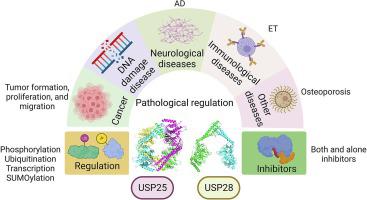BIOCHEMICAL PHARMACOLOGY ( IF 5.3 ) Pub Date : 2023-05-26 , DOI: 10.1016/j.bcp.2023.115624 Lihui Zhou 1 , Biying Qin 1 , Demna Mohamed Yassine 1 , Maoguo Luo 1 , Xiaoling Liu 2 , Feng Wang 1 , Yanfeng Wang 1

|
Deubiquitination is the reverse process of ubiquitination, an important protein post-translational modification. Deubiquitination is assisted by deubiquitinating enzymes (DUBs), which catalyze the hydrolysis and removal of ubiquitin chains from targeted proteins and play an important role in regulating protein stability, cell signaling transduction, and programmed cell death. Ubiquitin-specific peptidases 25 and 28 (USP25 and USP28), important members of the USP subfamily of DUBs, are highly homologous, strictly regulated, and closely associated with various diseases, such as cancer and neurodegenerative diseases. Recently, the development of inhibitors targeting USP25 and USP28 for disease treatment has garnered extreme attention. Several non-selective and selective inhibitors have shown potential inhibitory effects. However, the specificity, potency, and action mechanism of these inhibitors remain to be further improved and clarified. Herein, we summarize the structure, regulation, emerging physiological roles, and target inhibition of USP25 and USP28 to provide a basis for the development of highly potent and specific inhibitors for the treatment of diseases, such as colorectal cancer, breast cancer and so on.
中文翻译:

高度同源的去泛素酶泛素特异性肽酶 25 和 28 的结构和功能:深入了解其病理生理学和治疗作用
去泛素化是泛素化的逆过程,泛素化是一种重要的蛋白质翻译后修饰。去泛素化由去泛素化酶 (DUB) 协助,该酶催化目标蛋白质中泛素链的水解和去除,在调节蛋白质稳定性、细胞信号转导和程序性细胞死亡中发挥重要作用。泛素特异性肽酶25和28(USP25和USP28)是DUB USP亚家族的重要成员,同源性高、调控严格,与癌症、神经退行性疾病等多种疾病密切相关。最近,用于疾病治疗的针对USP25和USP28的抑制剂的开发引起了极大的关注。几种非选择性和选择性抑制剂已显示出潜在的抑制作用。然而,这些抑制剂的特异性、效力和作用机制仍有待进一步完善和阐明。在此,我们总结了USP25和USP28的结构、调控、新兴生理作用和靶点抑制,为开发用于治疗结直肠癌、乳腺癌等疾病的高效特异性抑制剂提供基础。































 京公网安备 11010802027423号
京公网安备 11010802027423号